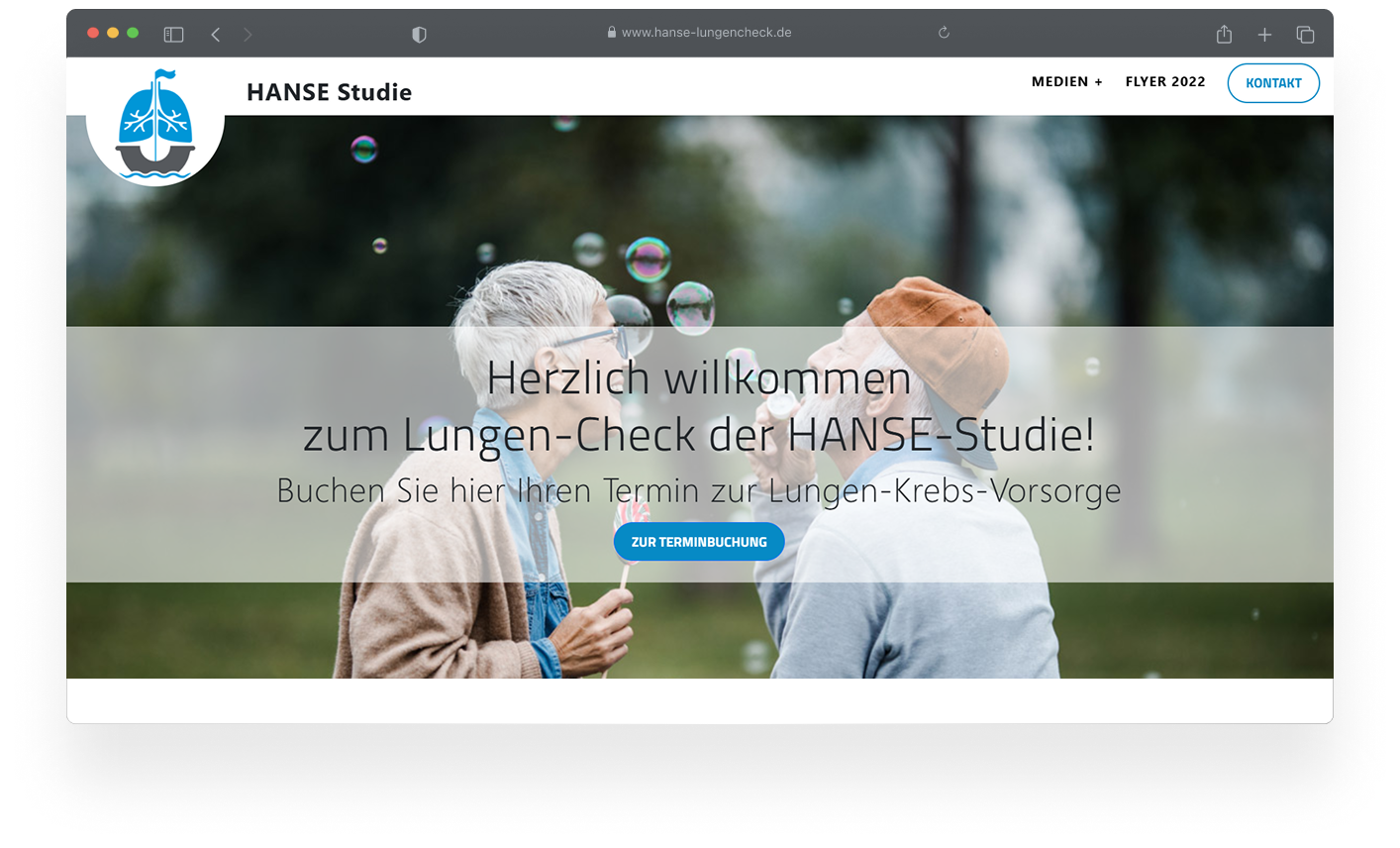HANSE Study: Patient Recruitment on a Large Scale
Created: 09.26.2025
Situation
Lung cancer is one of the deadliest forms of cancer worldwide. It has long been known that early detection using low-dose computed tomography (LDCT) can significantly reduce mortality rates. Nevertheless, until recently, there was no nationwide screening program for high-risk patients in Germany. Against this backdrop, the HANSE study was initiated in 2021 – a flagship project with the aim of breaking new ground in prevention and early detection.
Goal
The HANSE study pursued an ambitious goal: to create an evidence-based foundation for national lung cancer screening by identifying, addressing, and examining a broad risk group using digital and mobile infrastructure.
Specifically, the aim was to:
-
reach as many high-risk patients as possible and motivate them to participate,
-
create low-threshold, digitally supported access to screening,
-
use AI to perform effective evaluation and risk assessment,
-
provide data for health policy decisions at the federal level.
Challenge
Recruiting patients for preventive screening programs is traditionally difficult. Several factors posed challenges in the HANSE study:
-
Lack of a national screening infrastructure and low public awareness: Without a standardized program, awareness and willingness to participate were limited.
-
High age of the target group (55–79 years): Skepticism toward digital tools and online registration was expected.
-
Scale and diversity of the audience: Multiple thousand potential participants needed to be reached, informed, and motivated.
-
Logistical complexity: Mobile CT trucks rotated between Hanover, Lübeck, and Großhansdorf, requiring participants to actively schedule and attend appointments.
These circumstances made it particularly difficult to attract patients. Creative measures were needed to build visibility and trust.

Solutions
To meet these challenges, a comprehensive, digitally supported solution was developed:
1. Digital reach through multi-channel campaigns. The study relied on a broad-based media strategy:
-
Social media ads (Facebook, YouTube)
-
Targeted Google Ads
-
Personalized print mailings
-
TV and newspaper reports to increase credibility
2. Low-threshold online registration. Participants were able to register online independently and book an appointment directly. The digital process included:
-
Online questionnaire for risk assessment
-
AI-supported pre-selection of participants
-
Self-booking system for CT appointments in a mobile diagnostic truck

Results
The results of the HANSE study’s recruitment
| Key Figure | Result |
|---|---|
| People contacted | > 400.000 |
| Registered patients | > 13.000 |
| Participants (CT scan) | 5.191 in 15 months |
| Online registration rate | > 60 % of participants |
| Follow-up project | HANSE SOLACE: > 3.000 Patient:innen in < 4 Monaten |
Impact
The Federal Joint Committee (Gemeinsamer Bundesausschuss, G-BA) has officially approved annual low-dose CT (LDCT) screening for high-risk individuals aged 50–75 with a history of heavy smoking to be covered by Germany’s statutory health insurance (GKV).
This decision was strongly supported by the Hanse study, which provided critical real-world evidence proving that risk-adapted screening is both feasible and clinically effective. The nationwide screening program, scheduled to launch by April 2026.
Conclusion
The HANSE study demonstrated that large-scale patient recruitment in Germany is possible, even in an older target group, when combining broad media presence with a digital-first patient journey. The seamless integration of awareness campaigns, online tools, and AI support enabled efficient recruitment and high patient engagement. Most importantly, the study set the foundation for the first-ever national lung cancer screening program in Germany, marking a milestone in preventive healthcare.
References
Alcedis Blog: HANSE-Studie – Ein Projekt dieser Größenordnung gab es bislang nicht
Alcedis Blog: Warum die HANSE-Studie einen Unterschied macht
https://www.hanse-lungencheck.de/
https://pubmed.ncbi.nlm.nih.gov/35917826/
https://www.alcedis.de/de/blog/hanse-studie-ein-projekt-dieser-groessenordnung-gab-es-bislang-nicht

